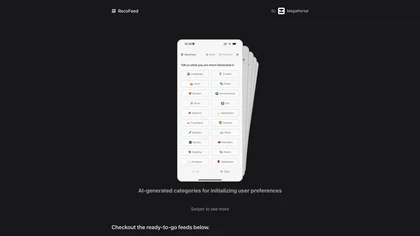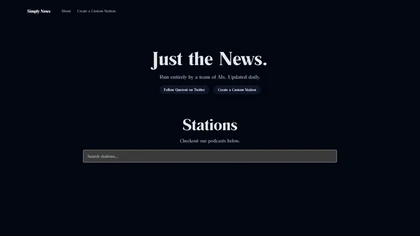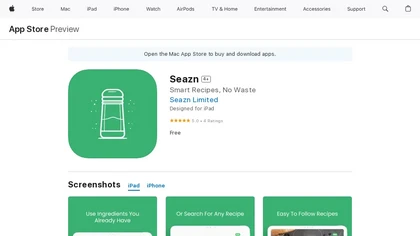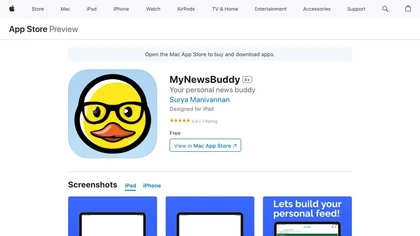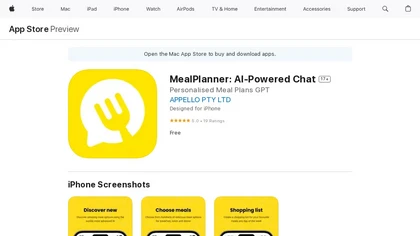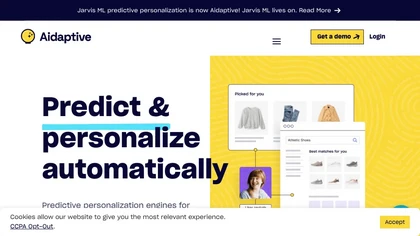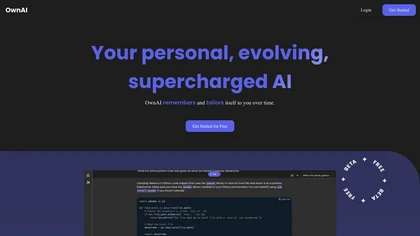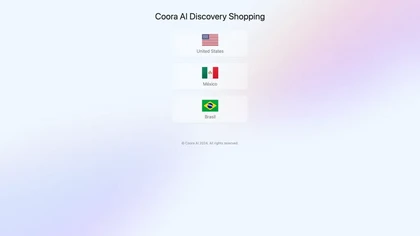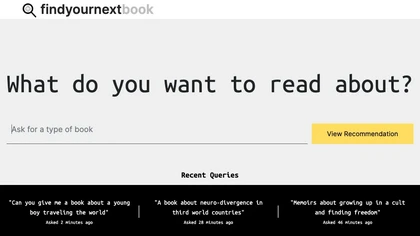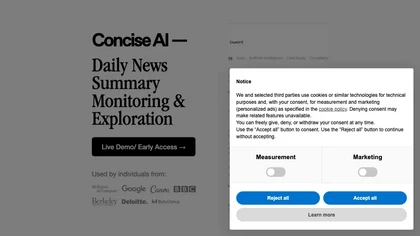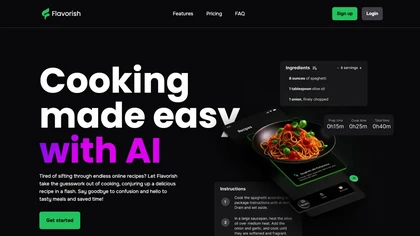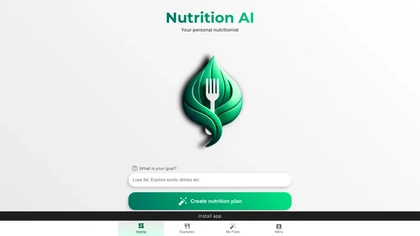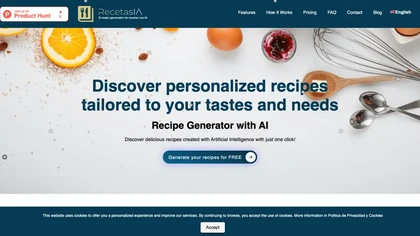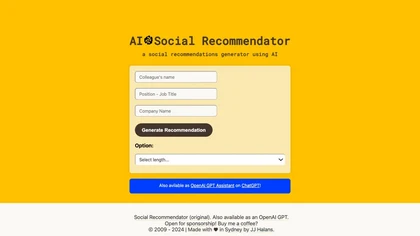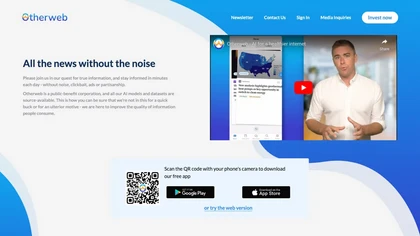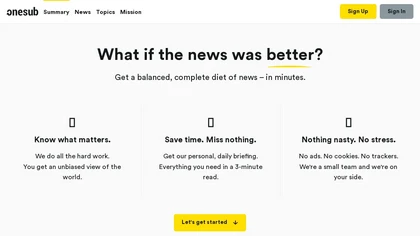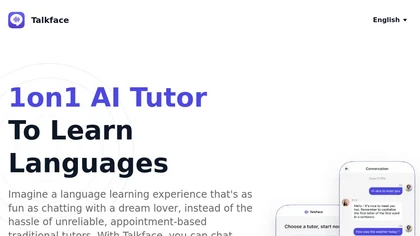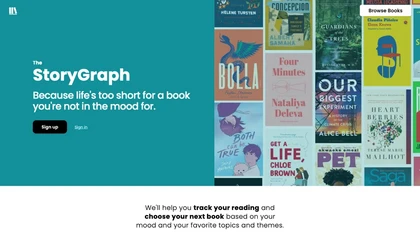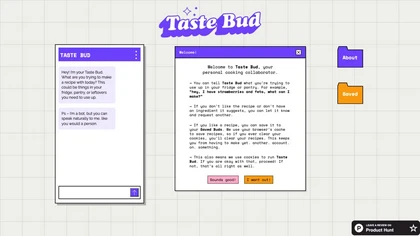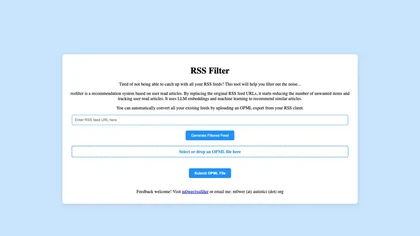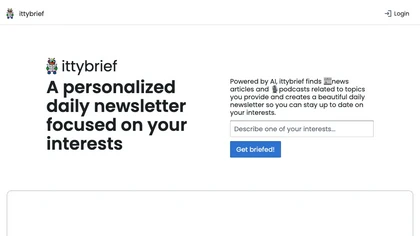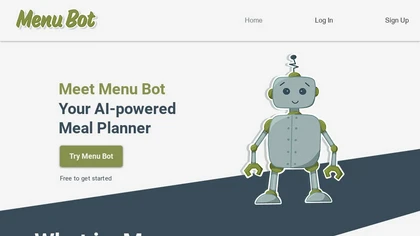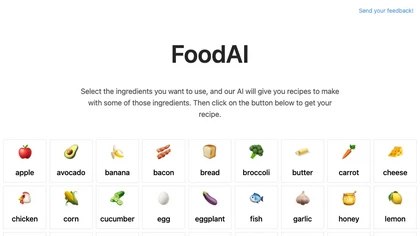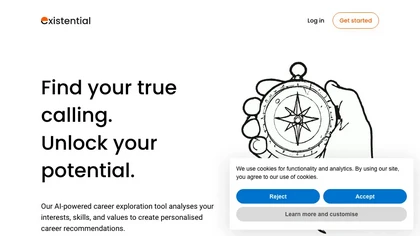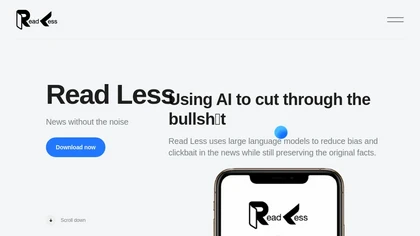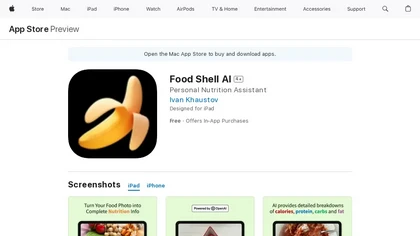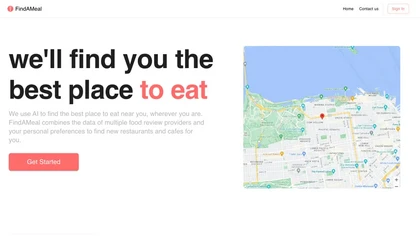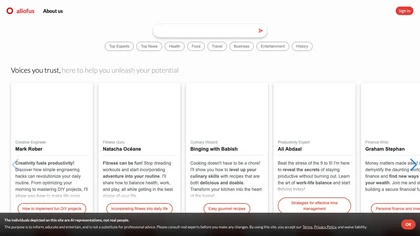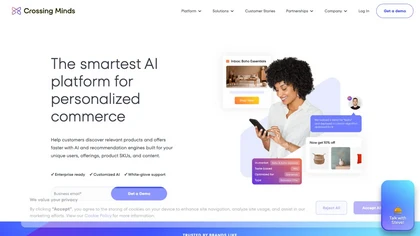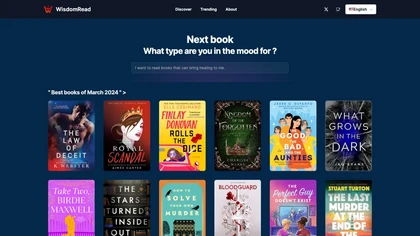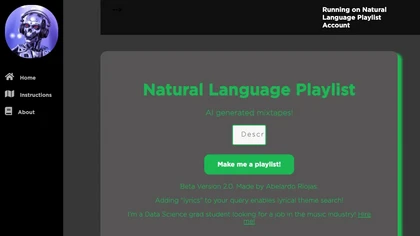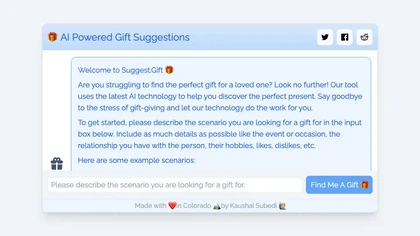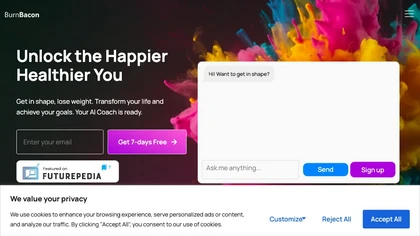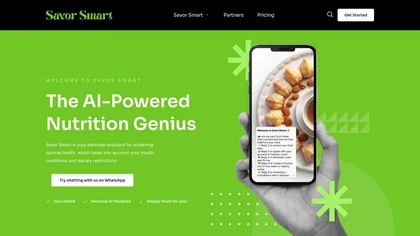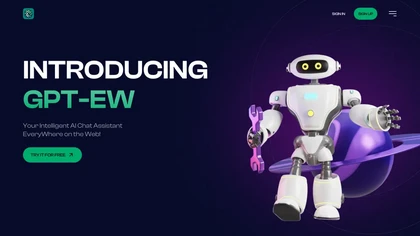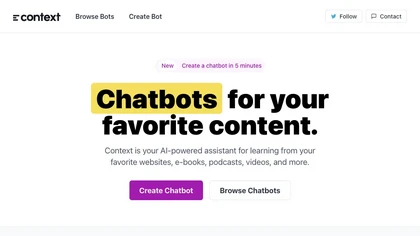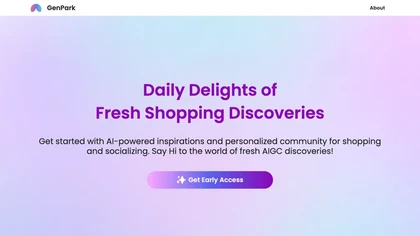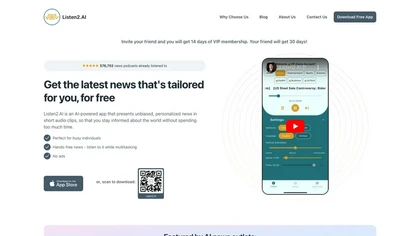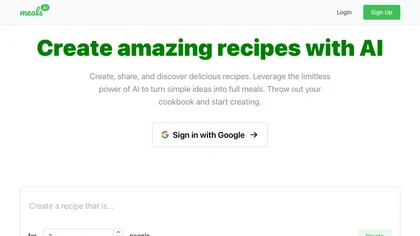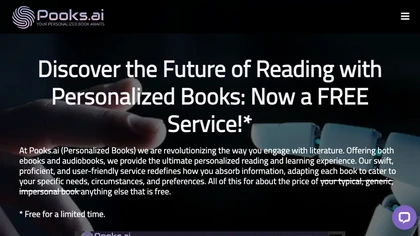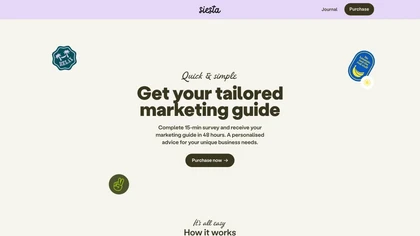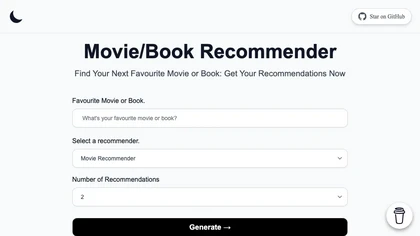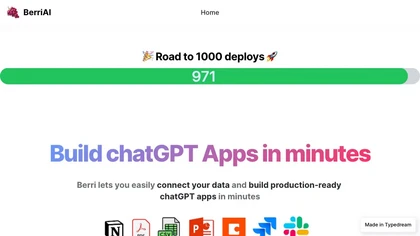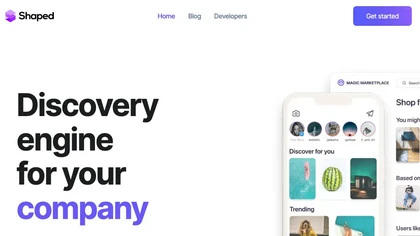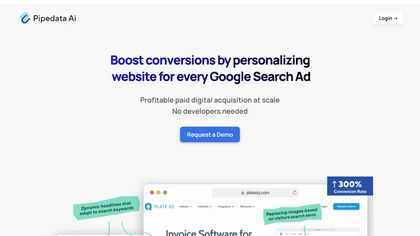AI use cases for Information consumption
Generative AI can be applied in various applications for information consumption. Here are some examples to explore below for inspiration with AI tools to get you started with using AI in information consumption.
🛠️ 70 AI tools for Information consumption
Explore a dynamic list of some of the most popular tools to get you started with various AI use cases and applications for Information consumption to streamline your workflows and productivity today.
RecoFeed features
- Personalized recommendation feeds
- Cross-platform vector database (CloseVector)
- Local real-time recommendation generation
- Free basic services
- Closed beta phase
Tailor features
- Curate personalized news
- Add content from newspapers, youtube channels and podcasts
- Daily digest with important information
- Digest in both text and audio formats
Simply News features
- Custom news stations creation
- AI-powered daily updates
- Multilingual news articles
- Tailoring news to user preferences
- Coverage of various topics
YouGotCooking features
- Recipe suggestion based on available ingredients
- AI-powered personalized recipe recommendations
- Consideration of physical taste in recipe suggestions
- Multilingual support for recipe suggestions
- Utilizes GPT-3 model for enhanced results
Mealpractice features
- Recipe generation
- Ingredient selection
- Nutrition style customization
- Protein selection
- Cuisine style selection
Seazn features
- Generate personalized recipes
- Learns cooking habits
- Updates knowledge
- Filter recipes by meal type and cooking time
- Reduce food waste
MyNewsBuddy features
- Personalized news updates
- Scans the web daily
- User privacy protection
- Compatibility with multiple devices
- English language support
🔥
Create your account, save tools & get personal recommendations
Receive a weekly digest of our handpicked top tools.
Unsubscribe anytime
MealPlanner features
- Personalized meal planning
- Tailored meal plans based on dietary restrictions
- Customized meal plans based on personal taste and preference
- In-app shopping list feature
- Step-by-step cooking instructions
Aidaptive features
- Recommendations
- Pricing
- Search
- Merchandising
THERAi features
- Memory system for learning from past interactions
- Free image generation feature using state-of-the-art technology
- Supercharged tools for web search
- Adaptive multi-modal communication (text, voice, interactive)
- Data security and privacy prioritization
AI Meal Planner features
- Generates personalized meal and workout plans
- Includes fitness chatbot support
- Provides recipes
- Tailored to user's goals and needs
- Pricing options available
Coora AI features
- Personalized product recommendations
- User preference analysis
- Streamlined shopping process
- Wide range of curated products
Find Your Next Book features
- Personalized book recommendations
- Analyze reader preferences and interests
- Suggest books based on genre, author and other criteria
- Include ratings and reviews from other readers
MealForMe features
- Meal suggestion based on preferences and dietary needs
- Personalized meal recommendations
- Tracking of daily health metrics for suggesting meal options
- Simple registration process with setup of likes and dislikes
- Collaboration with restaurants for customer engagement
Concise features
- News monitoring
- Summarization
- Individualized features
- Consent management
- Cookie tracking
Flavorish features
- Recipe recommendation based on input ingredients and preferences
- Auto-generated shopping lists
- Save and personalize recipes
- Ad-free experience
- Access to recipes offline
WizEats features
- Personalized recipe generation
- Budget-friendly meal recommendations
- Customizable food options
- Cooking equipment consideration
- Restaurant recommendations
NutritionAI features
- Customized nutrition plans creation
- Tailored meal plans examples
- Focus on privacy and user control
- Installation at home
- Platform login feature for support and queries
RecetasIA features
- Personalized recipe generation
- Customization based on tastes and dietary restrictions
- Instant recipe generation
- User feedback integration
- Free and premium subscription options
Well Me Right features
- AI matching and Health Coach capabilities
- Personalized coaching
- Dietary tracking, nutritional guidance
- Guided meditation sessions
- Adaptive health partner
AI Social Recommendator features
CookMe App - AI Cooking Assistant features
- Create ai-generated personal recipe
- Customize food settings in different languages
- Share culinary adventures
- Express creativity by asking for donations
- Get support from fellow food lovers
Sociask features
- Personalized course creation
- Tailored learning experiences
- Adaptive learning approach
- Use of intuitive examples and analogies
- Utilization of AI for enhanced comprehension
ChefBot features
- Recipe generation based on user preferences and available ingredients
- Customizable settings for dietary restrictions, meal type, and cuisine preferences
- Detailed instructions and cooking tips provided for each recipe
- Caters to both experienced chefs and beginners
- Facilitates exploration of new dishes and flavors
AIvocado features
- Food image recognition
- Nutrition analysis
- Personalized tracking
- AI diet assistant
- Long-term diet tracking
Otherweb features
- Cutting-edge AI models
- Effective detection of misinformation and propaganda
- Customizable news feed
- Hands-free news article listening feature
- Nutrition label summarizing article content
OneSub features
- Getting news
- Filtering news
- Staying informed
- Reducing stress
- Calming emotional health
Talkface features
- 1-on-1 tutoring
- Personalized curriculum
- Language learning
- Fun and engaging
- Affordable solutions
- Eliminates need for unreliable tutors
- Available on android and ios devices
The StoryGraph features
- Intuitive tracking features
- Insightful stats
- Personalized recommendations powered by machine learning AI
- Customize book selection based on mood, topics, and themes using filters
- Add live reactions without spoilers while reading with friends
Taste Bud features
- Recipe suggestions based on available ingredients
- Alternative ingredient suggestions
- Specific cooking tools recommendations
- Dietary preference filtering
- Voice-activated interaction with the AI assistant
RSS filter features
- Recommendation system based on articles read
- LLM embeddings machine learning
- Convert existing feeds using OPML file
- Generate filtered feed by selecting and dropping OPML file
- Feedback mechanism
Augment AI features
- Keep track of scattered digital life
- Learns and accesses data from various apps
- Automatically saves and summarizes important information
- Creates personalized content
- Anticipates and completes sentences
Lifesage features
- Health
- Wealth
- Wisdom
- Personal development
- Self-improvement
ittybrief features
- Curate articles and podcasts
- Provide daily newsletters
- Customizable based on interests
Mymealplan features
- Generates personalized meal plans
- Curates a list of the best recipes from the web
- Easy-to-use app
- Caters to various dietary preferences
- Provides grocery list for easy shopping
Menubot features
FoodAI features
- Generate recipes
- Filter results
- Select ingredients
- Cuisine selection
- Dietary preference filter
Existential features
- Career exploration
- Interest analysis
- Skills assessment
- Value alignment
- Potential career path suggestion
Readless.ai features
- Renders news in multiple languages
- Pulls from a network of reputable publishers
- Condenses stories into bite-sized or bulleted summaries
- Effectively counters bias, clickbait, and information overload
- Tailors news feed to user preferences
Food Shell AI features
- nutrition information analysis based meal photos
- calories tracking
- personalized recommendations
- photo food logging
- OpenAI GPT-vision technology
BodyGuru features
- Personalized wellness routines generation
- Tailored recommendations
- Free platform
- Upcoming features integration
- Developed by JBBAE
FindAMeal features
- AI-powered search engine
- Combines data from multiple food review providers
- Interprets search queries accurately
- Tailored recommendations based on personal preferences
- Aggregates information from various restaurant data providers
crossingminds.com features
- Data enrichment with intuitive tags and properties
- Personalized product recommendations for various industries
- Behavior-based approach to recommendations
- Seamless integration with existing tech stacks
- Driving cross-selling and upselling opportunities
WisdomRead features
- Personalized book recommendations
- Matching books to current mood
- Wide array of book genres
- Recommendations for specific time periods
- Transmuting words into wisdom
MyFit AI features
- Program generation
- Meal plan generation
- Saving programs
- Input personal data
Natural Language Playlist features
- Generate playlists based on user queries related to song lyrics
- Recommend music based on specific genres and themes
- Allow users to describe and personalize their playlist using multiple sentences and adjectives
- Transform words into intelligible music recommendations
- Widen listeners' music horizons and enrich their relationships with music
ConsumerAI features
- Product recommendation
- Ai based
- Question
- Problem solving
Suggest Gift features
- Suggesting great gift ideas
- Eliminating stress of gift-giving
- Using latest technology
- Input details about person and occasion
BurnBacon features
- Workout plans
- Customized meal suggestions
- Motivational support
- Fitness guidance
- Data-driven solutions
Savor Smart features
- Personalized meal plans
- Consideration of health conditions and dietary restrictions
- Chatbot integration on WhatsApp
- Blood sugar control and weight loss support
- Contextual reminders throughout the day
GPT-EW features
- Contextual understanding
- Tailored assistance
- Real-time support
- Seamless integration into web browser
- Personalized AI features and settings
Local Buddy features
- AI-powered travel planner
- Provides personalized recommendations
- Offers unique places to eat, landmarks to explore, and immersive activities
- Integrates with Google Maps for step-by-step directions
- Available on Android and iOS
Context features
- Learn from favorite website
- E-book
- Podcast
- Video
- Trending bots
- Newly released options
- Quick access
Gift Genie AI features
- Suggesting gifts
- Personalized recommendations
- Delighting recipients
- Occasional use
- Subscription
GenPark features
- Personalized content curation
- Advanced artificial intelligence utilization
- Tailored shopping journey
- Unique shopping experience
- Cutting-edge AI technology
Insightful features
- Provide personalized on-demand coaching
- Focus on specific needs
- Available anytime, anywhere
- Blog with latest insights on living a fulfilling life
- Accountability coaching to help young professionals reach full potential
Solvemigo features
- Solving queries in various areas
- Accessing ai-powered tools anytime
- Convenient voice input feature
- Support for over 60 languages
- Personalized advice and support
Centenarian features
- Personalized sleep coaching
- One-on-one chat with ai sleep coach supercentenarian
- Track biometrics, environment, and progress
- Reminders and recommendations based on ai analysis of sleep data
Sage features
- Personalized health advice
- Meal planning
- Customized exercise recommendations
- Tracking daily activities
- Monitoring progress
Listen2.AI - News & Podcasts features
- Personalized news delivery
- Short audio clips
- Customizable news experience
- Multi-language support
- Political perspective control
flowRL features
- Real-time UI personalization
- Leveraging state-of-the-art ML models
- Using reinforcement learning algorithms
- Continuous learning from user data
- Automatic selection of the best UI for individual users
MealsAI features
- Recipe creation
- Dietary restriction consideration
- Available ingredient recommendation
- Note addition
- Personalization
Pooks features
- Create personalized ebooks
- Create personalized audiobooks
- Personalized reading experience
- Tailed to specific needs and preferences
- Free limited time offer
Siesta features
- Personalized marketing guide generation
- Survey completion in 15 minutes
- Tailored to unique business needs
- Step-by-step instructions
- Convenient to-do list for tracking progress
Movie & Book Recommender features
- Movie recommender
- Book recommender
- Can offer 2, 4, 5, 6, 8, or 10 recommendations
Berri AI features
- Personalize chatbot
- Use custom data
- Answer user questions
- Generate health report summaries
- Understand article contents
Shaped features
- Personalized recommendation system
- Real-time recommendation generation
- Industry-specific recommendations
- User engagement analysis
- Easy-to-use api tool
Pipedata AI features
- Tailoring web content based on individual user behavior
- Maximizing profitability of paid digital campaigns
- Headline and copy personalization
- Image selection optimization
- Call-to-action optimization
